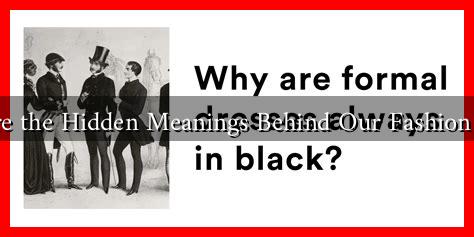-
Table of Contents
What Are the Hidden Meanings Behind Our Fashion Choices?
Fashion is often seen as a superficial aspect of life, a mere reflection of trends and aesthetics. However, beneath the surface lies a complex web of meanings and messages that our clothing choices convey. From cultural identity to personal expression, the garments we wear can tell a story about who we are, where we come from, and how we wish to be perceived. This article delves into the hidden meanings behind our fashion choices, exploring the psychological, social, and cultural factors that influence what we wear.
The Psychology of Fashion Choices
Our clothing choices are deeply intertwined with our psychological state. Psychologists have long studied the relationship between fashion and self-perception. The way we dress can significantly impact our mood and confidence levels. For instance, wearing formal attire can enhance feelings of authority and professionalism, while casual wear may evoke comfort and relaxation.
- Color Psychology: Colors evoke emotions and can influence our behavior. For example, wearing red can convey confidence and power, while blue is often associated with calmness and trust.
- Style and Identity: The styles we choose—be it bohemian, preppy, or punk—often reflect our personality traits and values. A study published in the journal “Social Psychological and Personality Science” found that people can accurately judge others’ personalities based on their clothing choices.
Fashion as a Form of Social Communication
Fashion serves as a powerful tool for social communication. The clothes we wear can signal our social status, group affiliation, and even political beliefs. For instance, luxury brands often signify wealth and exclusivity, while thrifted or vintage clothing can represent sustainability and individuality.
- Social Status: High-end fashion brands like Chanel or Gucci are often associated with affluence. Wearing these brands can elevate one’s social standing in certain circles.
- Group Identity: Subcultures, such as goths or skaters, use fashion to express their group identity. The distinct styles within these groups create a sense of belonging and community.
Cultural Influences on Fashion Choices
Fashion is also a reflection of cultural heritage and societal norms. Different cultures have unique clothing styles that convey their history, traditions, and values. For example, traditional Japanese kimonos symbolize grace and elegance, while Indian saris represent cultural richness and diversity.
- Globalization: The rise of global fashion has led to a blending of cultural styles. However, this can sometimes lead to cultural appropriation, where elements of one culture are used without understanding or respect for their significance.
- Fashion Movements: Movements like the Black Lives Matter movement have influenced fashion choices, with many opting for clothing that promotes social justice and equality.
Case Studies: Fashion Choices in Action
Several case studies illustrate how fashion choices can convey deeper meanings. For instance, the “Me Too” movement saw many individuals wearing black to the Golden Globes as a statement against sexual harassment. This collective choice of color not only made a bold statement but also fostered solidarity among participants.
Another example is the rise of sustainable fashion. Brands like Patagonia and Stella McCartney have gained popularity as consumers become more conscious of environmental issues. Wearing sustainable fashion is not just a style choice; it reflects a commitment to ethical consumption and environmental responsibility.
Statistics on Fashion Choices
Understanding the impact of fashion choices can be quantified through various statistics:
- According to a survey by the American Psychological Association, 62% of individuals reported that their clothing choices affect their self-esteem.
- A study by McKinsey & Company found that 66% of consumers consider sustainability when making fashion purchases.
Conclusion: The Power of Fashion
Fashion is far more than just a means of covering our bodies; it is a powerful form of communication that reflects our identities, beliefs, and values. By understanding the hidden meanings behind our fashion choices, we can gain insights into ourselves and the world around us. Whether it’s the colors we choose, the brands we support, or the styles we adopt, each decision carries significance. As we navigate the complex landscape of fashion, let us remember that our choices can inspire change, foster community, and express our unique identities.
For further reading on the psychology of fashion, you can explore resources from the American Psychological Association.

